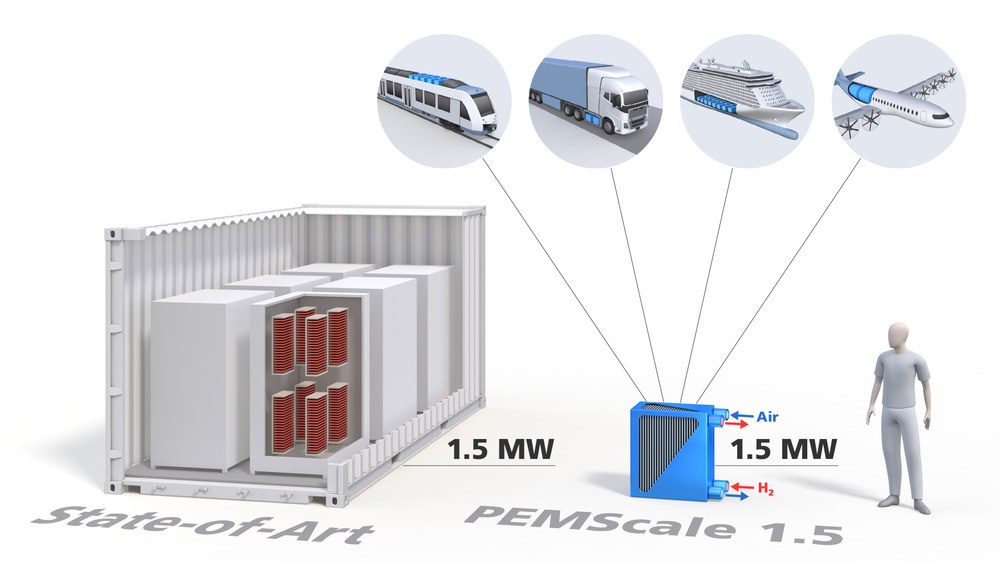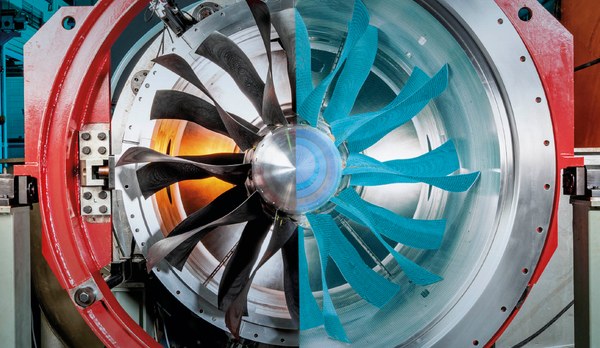PEMScale 1.5 – Concept for the development of a scalable fuel cell system for land, water and air in the megawatt range

A key challenge in developing climate-neutral propulsion for road, rail, maritime and aviation based on hydrogen and fuel cells is scaling up the power output of fuel cell systems from the kilowatt to the megawatt range while substantially increasing specific power (in kilowatts per kilogram). This task is significantly more complex for two-dimensional energy converters, like fuel cells, than for three-dimensional energy converters, such as gas turbines. While gas turbines can be scaled up by proportionally enlarging all dimensions, a similarly enlarged fuel cell would not be functional. This limitation stems from non-linear scaling effects of electrochemical processes, hydraulic resistance and challenges related to bending and sealing. Drawing on its extensive experience in fuel cell research, the German Aerospace Center (Deutsches Zentrum für Luft- und Raumfahrt; DLR) has developed specialised expertise in areas such as stiffening strategies for bipolar plates, flow control and cell design – from which promising scaling strategies can be derived and demonstrated in mobility applications in the current project.
In the PEMScale1.5 project, DLR is advancing concepts for a hydrogen fuel cell system to be used in transport applications including shipping, trains and aircraft. The project tackles the specific challenges associated with fuel cell systems and their components for use in the previously mentioned heavy-duty contexts. This is being done in cooperation with nine DLR institutes across the fields of energy, transport and aeronautics. The primary objective is to establish a guiding framework for the practical implementation of a generic, integrated fuel cell system with an output of up to 1.5 megawatts. This project emphasises close exchange between the development of a standardised fuel cell system and the specific requirements of ships, trains, commercial vehicles and aircraft.
Project objectives
- Development of a concept for a fuel cell stack and system for drive trains with an output of up to 1500 kilowatts. Operating a fuel cell stack requires a system is necessary that comprises components that form the hydrogen supply, air supply, cooling circuit and energy management. This system must be tailored to the application's requirements and the size of the stack.
- Definition of requirements for fuel cells in lorry applications.
- Definition of requirements for fuel cells in rail applications.
- Establishment of specifications for marine applications and test infrastructure for 1.5-megawatt systems.
- Development of a comprehensive concept for a fuel cell system suitable for use in aircraft.
- Development of a concept for a docking station for sector coupling, i.e. the integration of fuel cell and hydrogen technologies into the energy system, (buildings, neighbourhoods, cities, etc.) via dedicated docking stations.
PEMScale 1.5 project – Concept for the development of a scalable fuel cell system for land, water and air in the megawatt range
- Duration: 1 December 2021 to 31 December 2024
- Leading institute: DLR Institute of Engineering Thermodynamics
- Project type: Core funding, DLR impulse project
- Funding body: DLR Energy Programme Directorate









